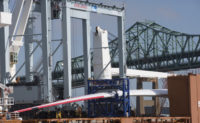Fletcher says it is important to recognize that this is the very beginning of a pilot project that will potentially produce electricity in a few years, but not on a large scale. “For the state of Maine, development of cost-effective technology is more important than finding a new way to generate electricity,” he says.
“We’re trying to develop a way to construct turbines on land and then float them out,” he says. Since Maine has local industry expertise in land-based wind construction and complex marine construction, it has the potential to achieve cost-effective capital construction to compete once it’s in the water, he says. “We want to become a world leader in research, manufacturing, construction and operation of floating wind turbines,” Fletcher says.
Since November 2009, when NRG acquired Bluewater Wind, the outlook for offshore wind and for the Delaware project has changed dramatically, according to NRG. Congress’ decision to eliminate funding for the Dept. of Energy’s loan guarantee program for offshore wind and the failure to extend the Federal Investment and Production Tax Credits for offshore wind—which credits expire at the end of 2012—have rendered the Delaware project both “unfinanceable and financially untenable for the present,” it states.
“Our people have worked hard, and we’ve made a considerable financial investment in the wind park, but that effort cannot overcome the difficult and unfortunate realities of the current market,“ says David Crane, NRG’s president and CEO. “We’re not giving up, but at this moment we can’t rationally justify further investment in this project without the prospect that it can move forward within a reasonable time frame.





